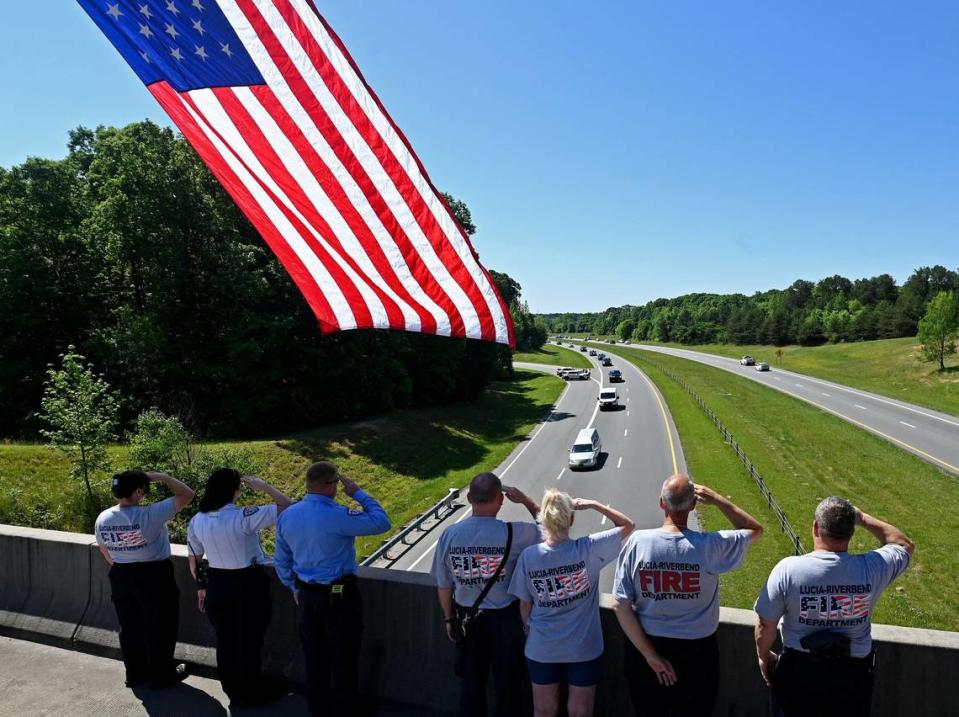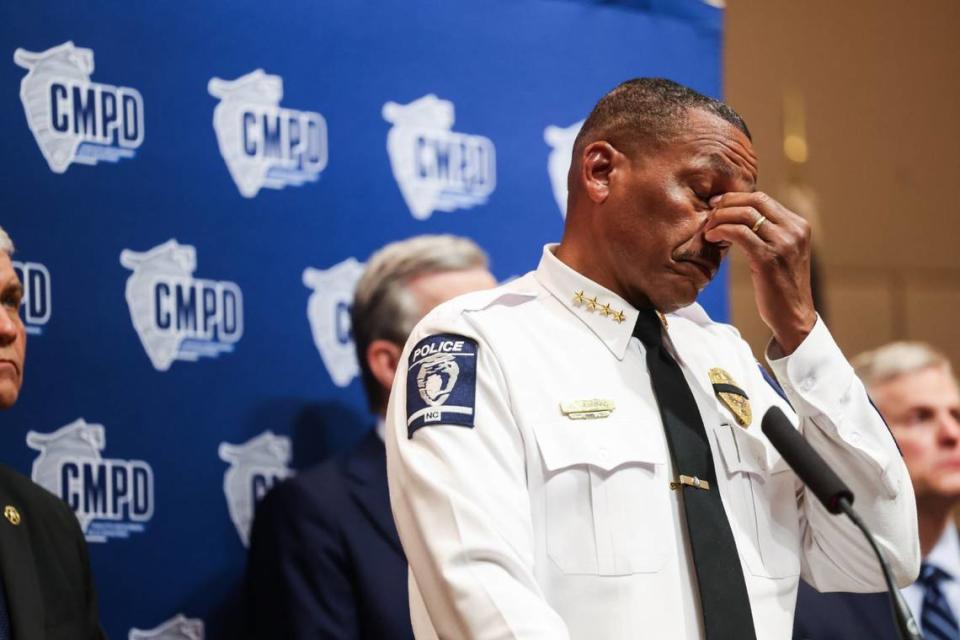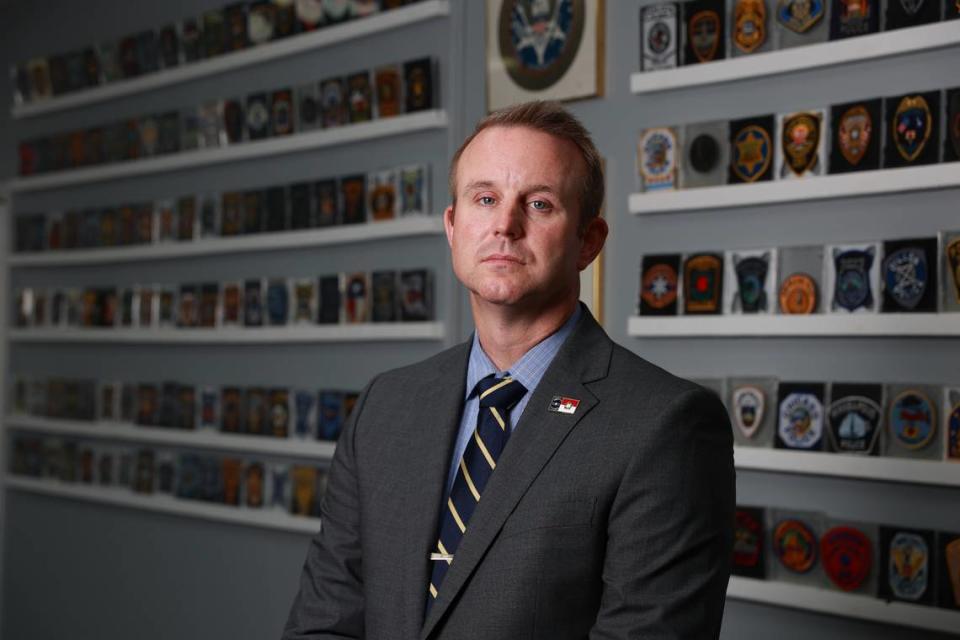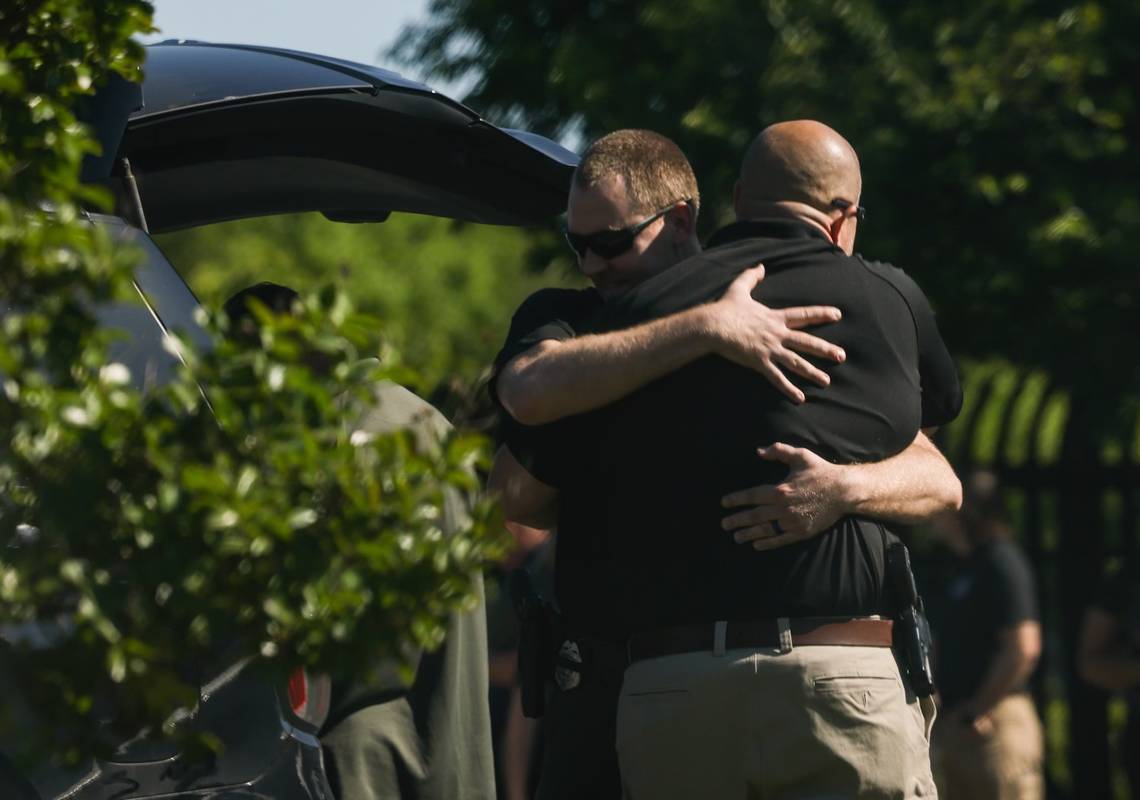It’s been 35 years since John Midgette patrolled the street. But there are still moments, he said, when the dangers come flooding back.
Midgette was only a few years on the job in Raleigh, sometime in the mid-70s, when he answered a domestic-violence call that still sticks with him. Midgette saw a man sitting on his porch with a rifle in his lap. As Midgette and a few other officers approached, the man picked up the gun and fired at them.
The rest comes in flashes: Midgette and the other cops scrambling for cover behind squad cars, the whizzing sound of a bullet just missing him, the relief he felt when the shooter dropped the rifle.
“This pales in comparison to what just happened, those tragedies. But it never leaves you,” said Midgette, who is now the executive director of the N.C. Police Benevolent Association.
It’s been just days since high-powered rifle fire hit officers attempting to serve arrest warrants at an east Charlotte home. Four officers were killed and four more are recovering from bullet wounds.
Deputy U.S. Marshal killed in Charlotte shooting identified

For law enforcement officers across Charlotte, the Carolinas and the country, the killings are a reminder of the lethal risks police face.
For many of the rest of us, they beg the question: What keeps officers on the job?
“You don‘t get into this job for the paycheck,” said Dan Redford, president of the Charlotte-Mecklenburg Fraternal Order of Police. “You get into the job because you want to be part of something greater than yourself.
“It takes a special person to do this job. And even a more special person to see what happened Monday and show up the following day to do it all over again.”
An unusually dangerous job
Several current and former police officers say there’s little question that police work has grown more dangerous in recent years. Official numbers bear that out.
In North Carolina, the number of officers killed in the line of duty has climbed since 2014.
Since the beginning of 2014, 80 officers have died on the job here, according to the Officer Down Memorial Page, compiled by a nonprofit dedicated to honoring fallen law enforcement officers.
In 2022, police officers in the U.S. died on the job at a rate nearly four times higher than workers overall, Bureau of Labor Statistics data shows.
Since the beginning of 2019, at least 63 officers in North Carolina have been shot while on duty, according to data compiled by the Fraternal Order of Police.
And the weapons encountered on the street can pose bigger risks. Forty years ago, some criminals carried small-caliber Saturday night specials, said Roy Taylor, who has served as police chief of several North Carolina police departments.
“But no one was running around with Glocks and AR-15s and AK-47s,” said Taylor, now a police consultant and chief of the Capitol Special Police, a private police department that operates under contract with public and private organizations in North Carolina.
CMPD CHIEF: Man who fatally shot 4 officers had ‘extensive criminal history’
Even officers who aren’t hurt during attacks carry burdens after the shooting stops. Some officers who responded to the east Charlotte home after the gunfire broke out have told Redford that they are now grieving and second-guessing their actions, he said.
“They’re sad. They’re frustrated. They’re mad,” Redford said. “…They continue to go back to blaming themselves. And wondering if there is more they could have done.”
But many see heroism in the CMPD officers who responded to the nightmarish scene, Redford said.
“They were listening to the radio. They knew an officer had been killed. But they still went out,” Redford said. “That’s the true definition of a hero.”
Fighting for respect
It’s not just the physical risks that make police work difficult. Some officers say it has become a thankless job.
Calls to “defund the police” have reverberated in many U.S. cities in recent years after a number of high-profile cases of police brutality, such as the 2020 killing of George Floyd in Minneapolis.
Nationally, people’s confidence in the police has declined. Just 43% of Americans had “a great deal” or “quite a lot” of confidence in police in 2023 — down from 57% in 2017, according to Gallup polls.
“I know some men who started down this career path. But they stopped because of the risks — and the lack of respect,” said former CMPD detective Thomas Geisler, who now runs Blue Chameleon Investigations, a Matthews based private detective agency.
“There’s become a big voice out there that’s anti-police. That wears on you,” he said.
Geisler said he knows some small and mid-size police departments in North Carolina that advertise for officers — and get no applicants.
But after Monday’s shocking ambush in Charlotte, even people who have been publicly critical of police had praise for how they serve the community.
A shootout, a livestream, an armored vehicle: What neighbors on Galway Drive saw Monday.
Aisha Dew, a member of the Charlotte Clergy Coalition For Justice, has been an activist in Charlotte for years. She joined 2016 protests after CMPD officer Brentley Vinson shot and killed 43-year-old Keith Lamont Scott.
Yet she and her organization worked alongside officers then to de-escalate certain protests and to ensure that protesters and police remained safe.
Even in conflict, police officers “have been our partners,” she stressed.
“And now a 3-year-old doesn’t have his dad,” she said, speaking of the young son of CMPD officer Joshua Eyer, who was among those killed Monday. “No matter where we fall in these spaces, we’re dealing with people.”
“The only way I think we can move forward is if we think of ourselves as ‘we’,” she added.
Doing more with less
In Charlotte, the population has grown far faster than the police force, Redford notes.
And that has left many officers stretched thin.
This weekend, for example, local police must provide security for the Lovin’ Life music festival as well as Saturday night’s Charlotte FC soccer match — in addition to all of their regular patrols and duties.
“It wears on officers because they never get to take a break,” Redford said. “They’re jumping from call to call.”


These problems align with national trends. A lack of work-life balance, limited job benefits and a perception, among some, that policing isn’t noble work, have made careers in law enforcement less appealing to prospective recruits, said Wade Carpenter, president of the International Association of Chiefs of Police.
With a shortage of applicants at some police departments, current officers are left to shoulder a heavier burden.
“Vacancies of officers have increased because officers become overworked and sometimes burned out,” Carpenter told The Charlotte Observer. “In an era where police suicide is higher, it’s important for us to focus on the mental wellness of our officers.”
Departments are doing a better job of recognizing that now than they did a decade ago, Wade said.
“We need to be thoughtful in how we are scheduling so we are not burning officers out,” Carpenter said. “But it’s tough because you need to have minimum manning to make sure that your shift has the appropriate coverage.”
Despite it all, officers find rewards
It’s possible that Monday’s tragedy will spur some officers to leave police work, Redford said.
“It’s not going to surprise me if we have a handful of officers who, after speaking to their spouses, decide this is not a profession for them,” he said.
But many will likely stay on the job.
“A lot of police are dedicated, service-oriented type of people,” Geisler said. “They really want to be out there to make a difference in the community.”
Samuel Poloche, slain correction officer, was a family man
Police departments reported an exodus of officers during the pandemic. But for the first time since then, police departments across the United States are reporting an increase in their ranks, says a new Police Executive Research Forum survey.
In January 2024, the survey found, the number of sworn officers in the U.S. was 0.4 percent higher than it had been a year earlier. And on April 19, CMPD held a graduation ceremony for 58 recruits — its largest graduating class since 2010.


As a third grader growing up in Akron, Ohio, Redford remembers being struck by the sight of a police officer on the playground. Something about that sight inspired him — and stuck with him when he later decided to go into law enforcement.
“The reward is when you hear someone tell you, ‘Thank you.’ Or if you’re fortunate enough to hear someone say, ‘You saved my life.’ or ‘You saved my kid’s life,’ ” Redford said. “What better feeling than knowing that was something you were a part of.”
